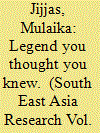|
|
|
Sort Order |
|
|
|
Items / Page
|
|
|
|
|
|
|
| Srl | Item |
| 1 |
ID:
097184


|
|
|
|
|
| Publication |
2010.
|
| Summary/Abstract |
This paper discusses two adapted works of the Malay filmmaker U-Wei Haji Saari (b 1954): Kaki Bakar (The Arsonist, 1995), from William Faulkner's short story 'Barn Burning' and Buai Laju-Laju (Swing My Swing High, My Darling, 2004) from the novel by James M. Cain, The Postman Always Rings Twice. A close reading of these two films provides some insights into the filmmaker's thoughts on where Malay society is heading in terms of development, progress, social change and cultural values. The films focus on the tension between the individual and society, which is heightened by state capitalism and the drive for economic success. Along the way, each film deconstructs the notion of the achievement and success of the New Economic Policy (NEP, 1971-90) and suggests that men and women manage and manifest their existential anxieties differently. The author argues that Kaki Bakar and Buai Laju-Laju highlight oppositional dreams of individual versus collective Malay identity through movement and stasis, gendering stasis as traditional and male (Old Malay) and upward mobility as female (New Malay). Finally, Buai Laju-Laju's morally ambiguous ending, in which the femme fatale triumphs over the anti-hero, subtly comments on the social and moral costs of a state capitalist ideology that privileges developmentalism and materialism over human ethics.
|
|
|
|
|
|
|
|
|
|
|
|
|
|
|
|
| 2 |
ID:
097182


|
|
|
|
|
| Publication |
2010.
|
| Summary/Abstract |
This article traces the evolution of narratives about the supernatural woman said to live on Gunung Ledang, from oral folklore to sixteenth-century courtly texts to contemporary films. In all her instantiations, the figure of Puteri Gunung Ledang can be interpreted in relation to the legitimation of the state, with the folklore preserving her most archaic incarnation as a chthonic deity essential to the maintenance of the ruling dynasty. By the time of the Sejarah Melayu and Hikayat Hang Tuah, two of the most important classical texts of Malay literature, the myth of Puteri Gunung Ledang had been desacralized. Nevertheless, a vestigial sense of her importance to the sultanate of Melaka remains. The first Malaysian film that takes her as its subject, Puteri Gunung Ledang (S. Roomai Noor, 1961), is remarkably faithful to the style and substance of the traditional texts, even as it reworks the political message to suit its own time. The second film, Puteri Gunung Ledang (Saw Teong Hin, 2004), again exemplifies the ideology of its era, depoliticizing the source material even as it purveys Barisan Nasional ideology.
|
|
|
|
|
|
|
|
|
|
|
|
|
|
|
|
|
|
|
|
|